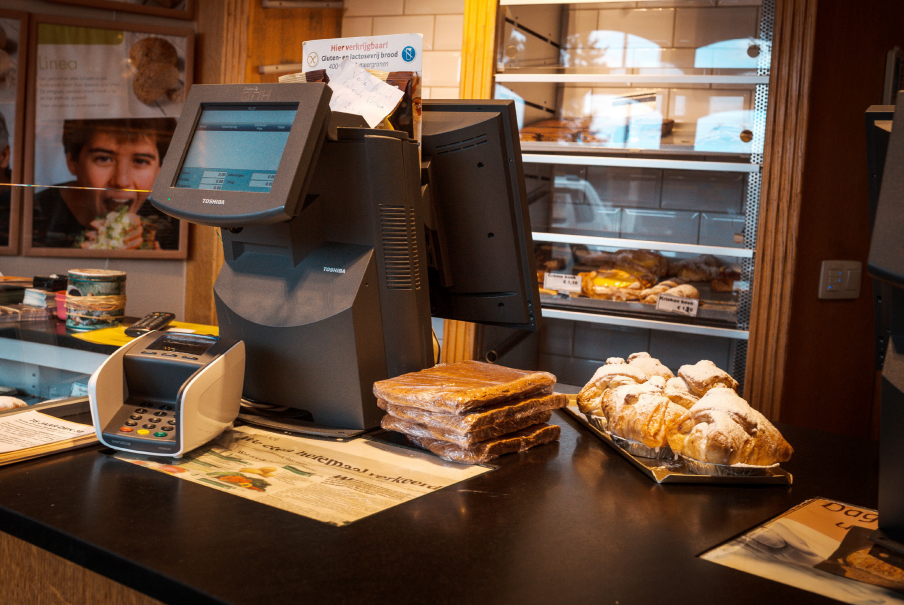
POS Solution with smarttill® Technology Speeds Up Service and Cash Counts at Antwerp Bakery
An apg® Case Study in Partnership with Antwerp Bakery

Cash represents 50 percent of transactions

Speeds up transactions

Quick end user training
Speed is essential in a retail bakery. Peckish patrons don’t want to wait in a
queue too long for their pastries and croissants. However, as cashiers make
change in a hurry to get to the next customer, speed can lead to mistakes. At
the end of the day when cash is counted, that’s when the mistakes turn up.
Wanting to speed up queues and eliminate cash losses, Nora Dekeirsmaeker, owner of Bakkerij Nora in Antwerp, Belgium, asked her POS integrator, Hasselt-based QNH, for a better checkout solution. The integrator recommended a complete POS system with its OmniQstore POS software and the smarttill® Intelligent Cash Drawer from apg®. When she heard what smarttill® could do, Dekeirsmaeker reacted by saying, “Impossible.” That changed when she saw the solution in action.

‘Less Work, More Control’
Dekeirsmaeker knew an intelligent cash management system would deliver significant improvements. smarttill® Intelligent Cash Drawer keeps track in real-time of cash amounts in each till compartment, no matter the currency or denomination. It produces a record of every transaction with time signature and cashier name, so discrepancies are easy to spot and fix.
“Some bakeries use weighing machines, some count cash manually, some take the cash to headquarters for reconciliation, and some would like to use more sophisticated cash management solutions. But they are expensive, costing €15,000, and slow down the transactions as they don’t accept all notes, and in bakeries, speed is everything,” says Peter Debrier, QNH Account Director of Retail.
Debrier says installation of the first system was fast and mostly trouble-free. End user training was quick because the system is intuitive and straightforward. The client is happy with the outcome of the installation because it delivered the desired results – “less work, more control,” he says. For instance, end-of-day cash counts are no longer needed, saving managers up to an hour, which is a
great benefit after a busy day.
In the past, with four people working the till each day, it was easier to make mistakes because employees have to work fast to avoid long queues. Speed is especially important on Saturdays and Sundays, when the bakery is busiest.
“Now if there is a mistake, it is quickly sorted with smarttill technology,” Dekeirsmaeker says. Another positive result is employees are now more cautious making change for customers because they know they can be held accountable.
Once installed, smartill®delivered immediate results, making the whole operation more efficient and addressing cash discrepancies. Additional benefits included a reduction in the time required to count and balance the till at the end of day. These labour savings were reapplied to the front end to improve customer service.
Speeding Up Cash Counts
In business for 36 years, Bakkerij Nora is an Antwerp institution. Daily customers pop in to buy the sandwiches, bread and pastries that made the bakery popular. Overall, cash represents 50 percent of the bakery transactions. Though most transactions are for relatively small amounts of money, the bakery handles a lot of cash.
Handling cash, as any retailer knows, is time-consuming, and Bakkerij Nora was no different. “We were counting cash by hand once a day, at the end of the day when we closed the store,” says Dekeirsmaeker. “We compared the figures with the data in sales reports and if they didn’t match, sometimes we had to count the cash again.”
When the till didn’t add up, there was no way to determine the source of the error or who was responsible because multiple cashiers use the same POS stations. The store had two cash drawers, each taking an average of 30 minutes to count and reconcile the float.
Once installed, smarttill® delivered immediate results, making the whole operation more efficient and addressing cash discrepancies. Additional benefits included a reduction in the time required to count and balance the till at the end of day. These labour savings were reapplied to the front end to improve customer service.


The smarttill® Solution speeds up transactions by making cashiers more efficient and minimizing mistakes.
Want to Dive Deeper Into smarttill®?
Explore More Case Studies
smarttill: A Supermarket’s Recipe for Reducing Labour and Cash Loss
Mobile wallets like Apple Pay and Google Wallet are notwithstanding, cash remains the preferred method of payment in a variety of settings…
Tech Savvy Convenience Store Features Innovative Cash Handling Technology
Convenience stores in the United Kingdom represent a £39.1 billion industry, about the same as industries such as oil and gas. Convenience stores number almost 50,000 and 72%…


